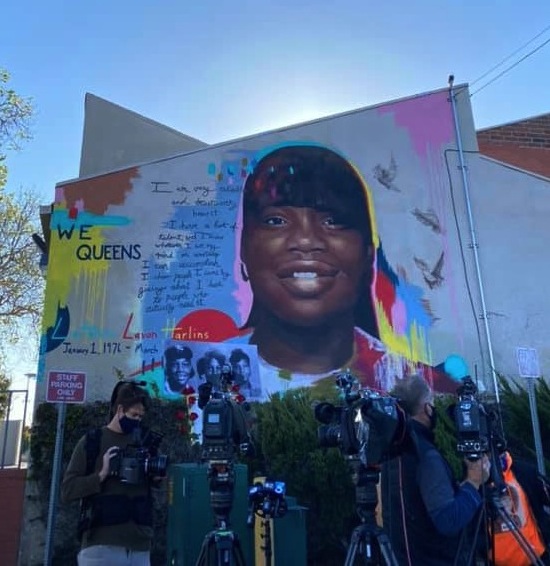Ceremony is held on 30th anniversary of Latash Harlins’ death
From Staff and Wire Reports
SOUTH LOS ANGELES — The playground at Algin Sutton Recreation Center was renamed in honor of Latasha Harlins on the 30th anniversary of her death at the hands of a Korean shop owner.
With a mural of Harlins looking over a gathering at the recreation center March 16, City Councilman Marqueece Harris-Dawson, Harlins’ family members and community activists were on hand for the ceremonies.
Harlins was the 15-year-old girl who was shot and killed by a store owner who accused her of trying to steal a bottle of orange juice on March 16, 1991.
“Before there was George Floyd, before there was Breonna Taylor, there was Latasha Harlins,” community activist Najee Ali said during the ceremonies at Algin Sutton Recreation Center. “Latasha Harlins was a child from our neighborhood, our community, and her murder still is painful 30 years later. It was one of the darkest days in the history of Black Los Angeles.
“But today is not a day of sadness, nor a day of mourning,” he added. “It’s a day of celebration. It’s a day we remember Latasha.”
The recreation center playground will now be known as the “Latasha Harlins Playground” in memory of the teen, although the official sign is not expected to be installed until next month, Harris-Dawson said.
The Harlins’ shooting is considered one of the touchstones of the South Los Angeles civil unrest of 1992. Harlins was killed 13 days after the video-taped beating of Black motorist Rodney King by four white Los Angeles police officers in the San Fernando Valley.
Harlins was a straight A student at Westchester High School with hopes of graduating high school, attending college and becoming a lawyer.
Those hopes were cut short by Soon Ja Du, the owner of Empire Liquor Store near the corner of Figueroa and 91st streets. Du believed that Harlins was trying to steal a $1.79 bottle of orange juice.
An accusation led to a physical altercation. As Harlins walked away, leaving the orange juice on the counter, Du reached for a gun underneath the counter and pulled the trigger, hitting Harlins in the back of the head, killing her instantly. Harlins still had the $2 she was going to use to pay for the orange juice in her hand when she died.
Eight months after the shooting, a jury found Du guilty of voluntary manslaughter, an offense that at the time carried a maximum sentence of 16 years in prison. But Los Angeles Superior Court Judge Joyce Karlin sentenced Du to only five years probation, 400 hours of community service and a $500 fine, saying “no matter what sentence this court imposes, Ms. Du will be punished every day for the rest of her life.”
The sentence was appealed but a state appeals court issued a ruling April 21, 1992, upholding Karlin’s sentence.
A week later, a jury in Simi Valley acquitted the four officers accused of beating King, igniting six days of rioting that left 63 people dead, nearly 2,400 injured, 12,000 arrested and more than $1 billion in proerty damage.
Empire Liquor Store burned to the ground during the riots.
“This is something that’s long overdue,” Harlins’ uncle, David Bryant, told ABC7 following the March 16 ceremony. “And I think that could be somewhat of a healing to the community.”
Tybie O’Bard, a childhood friend of Latasha, said the pair would frequent the park.
“First thing in the morning when she would come to my door, early in the morning, she’s like, ‘You ready to go to the park?’” O’Bard told Channel 7. “This is where we would be.”
O’Bard is among those featured in a 19-minute film titled “A Love Song for Latasha,” which this week earned an Oscar nomination for best documentary short. The Netflix film recounts her death, but is focused on the girl and the lasting impact her killing has had on the city.
“In the film, we do not use footage of her death,” the film’s director, Sophia Nahli Allison, told ABC7. “We’re not focused on her death but really on re-birthing the memory of who Latasha was.”
The mural of Harkins at the park was unveiled Jan. 1 on what would have been her 45th birthday.
The muralist, Victoria Cassinova, said she got involved with the project through Netflix, which released “A Love Song for Latasha” last September.
“The [Netflix] team reached out to me about the mural and Latasha’s story along with the documentary, and it all unfolded from there,” Cassinova said in January.
“I hope it empowers people to keep fighting for the value of Black lives, especially young girls and women,” she added.











